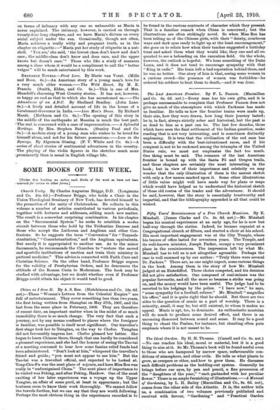China as I Saw It. By A. S. Roe. (Hutchinson
and Co. 12s. 6d. net.)—These " Woman's Letters from the Celestial Empire " are full of entertainment. They cover something less than two years, the first being written from Shanghai on May 27th, 1907, and the last from the same place in February, 1909. They are therefore of recent date, an important -matter when in the midst of so much immobility there is so much change. The very fact that such a journey, not by any means confined to places where the foreigner is familiar, was possible is itself most significant. Our traveller's .first stage took her to Tsingtau, on the way to Chefoo. Tsingtau did not favourably impress her. Chefoo pleased her better. She began to learn Chinese there, though that can hardly be considered a pleasant experience, and she had the honour of seeing the Tao-tai at a meeting convened to hear how some famine relief funds had been administered. "Don't look at him," whispered the traveller's friend and guide ; "you must not appear to see him." But the Tao-tai was a travelled official, and expected to be looked at. Teng-Chu-Fu was the next place of sojourn, and here Miss Roe was really in "unforeignised China." The next place of importance to be visited was Peking, and after Peking, Hankow. One of the most exciting of her later experiences was a voyage up the Upper Yangtse, an affair of some peril, at least in appearance ; but the boatmen seem to know their work thoroughly. We cannot follow the travels further, but we can say that they are worth following. Perhaps the most obvious thing in the experiences recorded is to be found in the curious contrasts of character which they present. That is a familiar remark when China is concerned; but the illustrations are often strikingly noveL So when Miss Roe has been telling us of the Chinese girls, with their " dainty, courteous ways and dark eyes ready to light up at the least encouragement," she goes on to relate how when their teacher suggested a birthday treat and asked them what they would like, they one and all re, quested to see a beheading on the execution field. . On the whole, however, the outlook is hopeful. We hear something of the Dalai Lama, and it does not tend to encourage sympathy with that "King in exile." His train left a bad reputation behind them, and he was no better. One story of him is that, seeing some women in a curious crowd—the presence of women was forbidden—he ordered his soldiers to beat them to death,—and it was done.














































 Previous page
Previous page